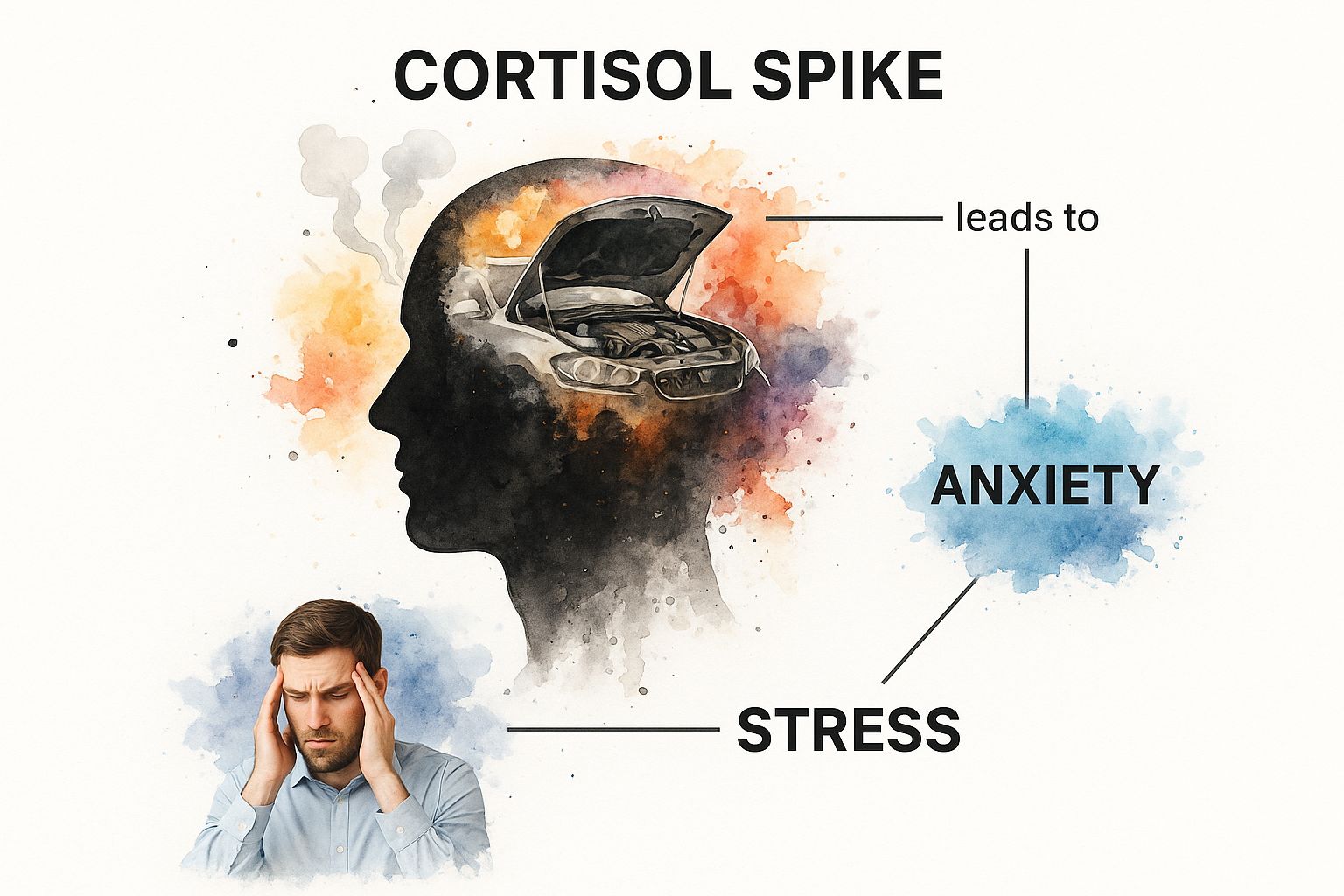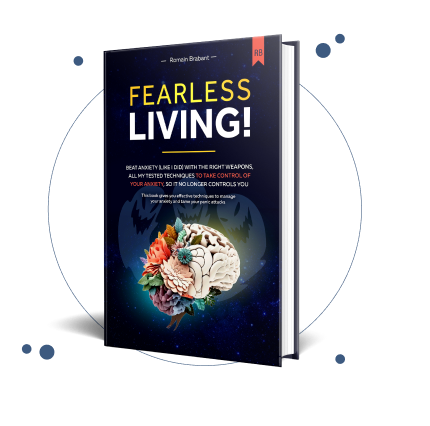
Waking up with a racing heart and a mind already swamped with worry is a deeply unsettling feeling. If this sounds familiar, you're not alone. Millions of people grapple with that sudden wave of panic that seems to hit hardest in the first quiet moments of the day.
It's easy to feel like you're broken or that something is fundamentally wrong with you. But the truth is much more hopeful.
What you're experiencing is often a predictable response, not a personal failing. Think of it as your body’s natural alarm system getting a bit overzealous. Your system is designed to wake you up, but sometimes the signals get crossed, turning a gentle nudge into a sudden jolt of fear. The good news is that you can learn to recalibrate this system and find peace.
Why Your Anxiety Is Highest in the Morning
That immediate dread you feel when you wake up? It's often a one-two punch of a natural spike in the stress hormone cortisol and a flood of anxious thoughts about the day ahead. This mix of biology and psychology can create a powerful feeling of panic before your feet even hit the floor.
The Morning Rush Explained
Understanding what’s actually happening inside your body and mind is the first real step toward taking back your mornings. This isn't some mysterious force you're powerless against; it’s a combination of specific factors you can learn to manage and ultimately overcome.
These factors usually fall into three camps:
- Your Body's Chemistry: A natural surge of stress hormones is designed to give you the energy to start your day, but it can easily be misinterpreted by an anxious mind as a threat.
- Your Mind's Habits: The quiet moments right after you wake up can become a playground for "what-if" worries and negative thought loops about your to-do list or potential problems.
- Your Daily Routines: Choices you make around sleep, diet, and your evening habits can either soothe your nervous system or supercharge your morning stress levels.
We'll get into the details of each of these, but first, here's a quick look at the main drivers behind that morning wave of anxiety.
Key Drivers of Morning Anxiety at a Glance
This table breaks down the most common reasons you might be waking up on edge. Think of it as a cheat sheet for understanding what’s going on behind the scenes.
| Factor Type | Specific Cause | How It Feels |
|---|---|---|
| Physiological | Cortisol Awakening Response (CAR) | A jolt of physical energy that feels like panic; racing heart, shallow breathing. |
| Physiological | Low Blood Sugar | Shakiness, irritability, and a sense of unease or weakness. |
| Psychological | Anticipatory Anxiety | A mind full of "what-ifs" and a sense of dread about the day's tasks. |
| Environmental | Poor Sleep Quality | Waking up feeling unrested, on-edge, and mentally foggy. |
| Psychological | Negative Thought Loops | Replaying past mistakes or worrying about future ones before you're even out of bed. |
Looking at these factors, you can start to see how interconnected they are. Poor sleep can worsen anxious thoughts, which in turn can make your body's natural cortisol response feel even more intense.
But here’s what I want you to remember: this experience is manageable. You are not destined to wake up in a state of panic forever. By understanding these triggers, you can start to shift the narrative from one of fear to one of empowerment. A panic-free morning isn't just a distant dream; it's an achievable reality, and your journey toward getting there starts right now.
The Biology of Waking Up Worried
To figure out what’s behind morning anxiety, it helps to look under the hood at your body’s internal chemistry. That sudden jolt of worry isn't just "in your head"—it's a very real, physical response. Once you understand that, you can start to see that your body isn’t your enemy. It’s just reacting to specific, manageable signals.
This infographic breaks down the key biological triggers, showing how factors like cortisol can feel like an engine revving way too high the moment you wake up.

As you can see, morning anxiety often starts with a biological spark that you can learn to manage—not a personal failing you have to endure.
The Cortisol Awakening Response Explained
One of the biggest players on the field is something called the Cortisol Awakening Response (CAR). Cortisol, often dubbed the "stress hormone," naturally peaks within the first hour of waking. Think of it as your body’s way of hitting the gas pedal to give you the energy you need to start the day.
For someone without chronic anxiety, this surge feels like a gentle nudge toward alertness. But when you’re already prone to worry, your system can misread this signal entirely. Instead of feeling awake, you feel ambushed.
Imagine your body’s stress system is a car engine. The CAR is supposed to be a smooth ignition. But for you, it’s like the engine is immediately redlining, flooding your system with stress signals. This creates physical sensations—a racing heart, tense muscles—before your mind has even had a chance to process a single thought.
This biological event can trigger a powerful fight-or-flight response, making you feel like you're in immediate danger even when you're perfectly safe in bed. To learn more about what's happening inside your body during these moments, our guide on the fight-or-flight response breaks it down.
How Sleep and Blood Sugar Fuel the Fire
While cortisol is a major factor, it rarely works alone. Two other biological triggers often join the party, creating a perfect storm for that morning wave of panic.
-
Disrupted Sleep Cycles: A night of restless sleep prevents your brain from doing its emotional housekeeping. Without quality rest, the prefrontal cortex—the part of your brain responsible for managing emotions—doesn't get a chance to recharge. This means you start the day with lower emotional resilience, making you far more vulnerable to anxious thoughts.
-
Low Blood Sugar: After fasting all night, your blood sugar levels are naturally low in the morning. Your body can interpret this dip as a sign of crisis, releasing more stress hormones like adrenaline to compensate. This chemical release can cause symptoms that feel identical to anxiety, like shakiness, irritability, and a racing pulse.
These biological processes aren't a sign that you're broken. They are simply signals your body is sending. The hopeful truth is that by learning to recognize and address these physical triggers—through better sleep hygiene, a balanced breakfast, and stress management techniques—you can begin to soothe your nervous system and reclaim your mornings. You have the power to turn that roaring engine into a gentle hum.
How Your Mind Fuels the Morning Rush of Fear
While your body’s chemistry can set the stage for morning anxiety, your mind often directs the show. That quiet moment between sleep and full wakefulness? It can create the perfect vacuum for anxious thoughts to rush in, turning a calm start into a mental sprint before you’ve even had your first sip of coffee.
If this sounds familiar, know that this experience is incredibly common. More importantly, it’s something you can absolutely learn to change.
The thoughts that ambush you aren't a sign that you’re broken; they're often just deeply learned habits. Think of your mind like a garden. Over time, pathways of worry can get worn into the soil. When your mind is still groggy and vulnerable in the morning, it's all too easy for your thoughts to slip into these familiar, negative ruts.

This mental process is what drives the psychological side of morning anxiety, but understanding it is the very first step toward taking back your peace.
The Trap of Anticipatory Anxiety
One of the biggest psychological triggers is what’s known as anticipatory anxiety. This is simply the habit of worrying about the day ahead—your to-do list, a tough conversation you need to have, or pressures at work—before it has even begun. Your mind leaps into the future, playing out worst-case scenarios and creating a sense of dread.
This mental dress rehearsal for potential problems sends a powerful signal to your body: you are already in a stressful situation. In response, your nervous system ramps up, dialing up the physical feelings of anxiety that your morning cortisol surge may have already kicked off.
When Worries Spiral into Catastrophe
Another common pattern is catastrophizing, where your mind grabs a small concern and blows it completely out of proportion. A simple thought like, "I feel tired today," can quickly spiral into, "I won't be able to handle my meeting, my boss will be angry, and I might lose my job."
This rapid escalation of fear is especially common when you’re not fully awake and your defenses are down. These thought spirals can feel incredibly real and overwhelming in the moment. You can learn more about the connection between overthinking and anxiety in our detailed guide, which breaks down why our minds get stuck in these draining loops.
The most powerful truth to hold onto is this: these thought patterns are learned habits, not permanent personality traits. Just as you learned to worry, you can learn new, healthier ways of thinking. This isn't about blaming yourself; it's about empowering yourself with the knowledge that change is possible.
The Good News: You Can Unlearn These Habits
Recognizing these mental habits is the key to dismantling them. You can learn to catch these thoughts as they arise and gently redirect your focus. It’s a process of retraining your brain, much like strengthening a muscle you haven't used in a while.
Here’s how these patterns often show up in the morning:
- Mental To-Do Lists: Waking up and immediately running through every single task you need to accomplish, feeling overwhelmed before your feet even hit the floor.
- "What-If" Scenarios: Your mind gets stuck imagining negative outcomes for future events, from social interactions to work projects.
- Replaying Past Events: Ruminating on a mistake from yesterday or a conversation that didn't go well, letting it set a negative tone for the new day.
These are not your destiny. They are simply signals that your mind needs a new, more compassionate direction. By learning to observe these thoughts without getting swept away by them, you can create a crucial space between a worry and your reaction to it.
That space is where you’ll find your power to build a truly panic-free life, one morning at a time.
How Your Daily Habits Affect Morning Anxiety
Your day doesn't start when your alarm goes off; it really begins with the choices you made the day before. The habits you keep—from what you eat for a late-night snack to how you unwind—have a direct and powerful impact on your nervous system. Once you understand this connection, you can start making small, intentional shifts that pave the way for calmer mornings.
Think of your nervous system as a finely tuned instrument. Certain lifestyle factors can crank up the volume, leaving it in a state of high alert and much more susceptible to that morning jolt of anxiety. The good news? You're the conductor.

This isn’t about blame; it's about empowerment. Recognizing how your daily routines influence your anxiety gives you a clear roadmap for change, turning what feels like an overwhelming problem into a series of manageable steps.
The Diet and Anxiety Connection
What you put into your body can either soothe your stress response or supercharge it. Some foods and drinks act like kindling for anxiety, leaving your system much more vulnerable when you wake up.
- Caffeine Overload: That late-afternoon coffee might feel essential, but caffeine can hang around in your system for hours. It disrupts your sleep quality and can leave you feeling wired and jittery the next morning.
- Sugar Spikes and Crashes: A high-sugar snack before bed sends your blood sugar on a roller coaster. When it plummets overnight, your body can interpret this crash as a threat, triggering a release of stress hormones that sets the stage for morning panic.
- Alcohol's Deceptive Calm: A drink might feel relaxing at first, but alcohol seriously messes with your sleep architecture. It leads to fragmented, poor-quality rest, dehydration, and a rebound effect that can ramp up anxiety levels as you wake up.
These aren't just minor details; they're key players in your internal chemistry. By making more mindful choices, you can create a more stable biological foundation for your mind. Our guide on lifestyle and diet changes for anxiety management is packed with practical tips to get you started.
You hold more power than you think. Every small, positive choice—like swapping a late-night snack for herbal tea or turning off screens an hour before bed—is a step toward healing. It’s about building a life that supports your peace, not one that accidentally fuels your panic.
Routines That Rewire Your Response
Your evening rituals send crucial signals to your brain, telling it whether it’s time to be on alert or time to rest. A chaotic evening or a lack of structure can keep your nervous system stuck in "on" mode all night.
This is a widespread issue. Anxiety disorders now affect roughly 4.4% of the world's population, and those numbers are climbing, especially among young adults. This just goes to show how vital it is to address the things we can control, like sleep patterns and stress management, which have a direct line to morning anxiety.
Think about these common anxiety-fueling habits:
- Late-Night Screen Time: The blue light from our phones and laptops messes with melatonin, the hormone that tells your body it's time to sleep. At the same time, the endless scroll of information keeps your mind racing long after you've turned out the lights.
- Inconsistent Sleep Schedules: Going to bed and waking up at different times confuses your body's internal clock. This can lead to poor sleep and contribute to those sharp morning cortisol spikes.
- A Missing Wind-Down Ritual: Without a clear transition from a busy day to a restful night, your brain never gets the memo to switch off. You're left feeling mentally and physically tense, even while you're trying to sleep.
When you start seeing these as habits you can change, you shift from being a victim of your anxiety to an active participant in your own recovery. Small, consistent changes build a powerful foundation for a panic-free life, proving that calm mornings are absolutely within your reach.
Actionable Strategies to Reclaim Your Mornings
Knowing why you feel anxious in the morning is a huge step. But turning that knowledge into action is where the real change begins.
Waking up in a state of panic does not have to be your reality. You can absolutely build a life where mornings feel peaceful again, and this section is your toolkit for getting there.
Think of these strategies less as a rigid set of rules and more as building blocks. You can pick and choose what works for you to create a new routine—one that feels supportive, compassionate, and designed just for you.
Prepare the Night Before
A calm morning almost always starts the night before. By winding down with intention, you send a clear signal to your nervous system that it’s safe to power down. This helps prevent that jarring cortisol spike from feeling so intense when your alarm goes off.
-
Create a Screen-Free Wind-Down: For at least an hour before bed, put away your phone, tablet, and laptop. It’s not just about the blue light disrupting your sleep hormones; it’s about giving your mind a break from the constant stream of information that keeps it in an alert, problem-solving mode.
-
Journal to Release Worries: Take five minutes for a "brain dump." Get everything that’s on your mind out onto paper—your to-do list for tomorrow, the fears nagging at you, any frustrations from the day. The simple act of writing it down keeps it from swirling in your head all night.
-
Set Yourself Up for Success: Do your future self a favor. Lay out your clothes, pack your lunch, or prep the coffee maker. Reducing the number of decisions you have to make when you’re most vulnerable in the morning can make a world of difference.
First Moments Awake
Those first few minutes after you open your eyes are crucial. Your mind will want to immediately jump onto its well-worn tracks of worry. Your job is to gently guide it toward a state of calm before your feet even touch the floor.
Your mind will want to race ahead to the day's challenges. Your job is to lovingly and patiently bring it back to the present moment, one breath at a time. This is a skill, and it gets stronger with practice.
One of the most powerful ways to do this is with your breath. Simple, deep breathing can activate your parasympathetic nervous system—your body's built-in "rest and digest" mode. To get started, you can explore our guide on breathing exercises for anxiety, which walks you through simple techniques you can do right from your bed.
Build a Gentle Morning
How you spend the first hour of your day can set the tone for everything that follows. The key here is to be intentional and steer clear of the triggers you now know are fueling your morning anxiety.
-
Avoid Your Phone for 30 Minutes: This one is tough, but it's a game-changer. Resist the urge to immediately check emails, news, or social media. This protects your mind from being flooded with other people's demands and gives you the space to ground yourself first.
-
Incorporate Gentle Movement: You don't need a grueling workout. A few simple stretches or a short walk can release feel-good endorphins and help dissipate that pent-up anxious energy, calming both your body and mind.
-
Expose Yourself to Natural Light: As soon as you can, open the blinds or step outside for a few moments. Sunlight helps regulate your internal body clock (your circadian rhythm) and gives your mood a natural boost. It’s also worth noting that beyond personal routines, your home environment can make a big impact; some people even explore things like the health benefits of installing a skylight to bring more natural light indoors.
By combining these strategies, you’re creating a powerful buffer against morning anxiety. You aren't just coping—you are actively rewiring your brain’s response and building a foundation for a life where panic doesn't run the show.
Knowing When to Seek Professional Support
While self-care strategies are incredible tools, sometimes the bravest and most powerful step is asking for professional help.
If your morning anxiety feels like too much to handle, consistently throws your day off track, or brings on persistent panic attacks, it might be time to talk to a mental health expert. This isn't a sign of weakness—it's a proactive move toward taking your life back for good.
Recognizing you need support is an act of strength. Think about reaching out if you find yourself constantly dodging work, school, or seeing friends out of fear. You don't have to walk this path by yourself.
A panic-free life isn’t some far-off dream—it is absolutely possible with the right support. Healing is a journey, and having a guide can make all the difference in finding your way.
Therapies like Cognitive Behavioral Therapy (CBT) are specifically designed to help you pinpoint and change the thought patterns that fuel your anxiety. A good therapist provides a personalized roadmap, helping you build resilience and develop coping skills that actually work.
To get a better sense of what’s out there, you can learn more about how psychotherapy for anxiety works and find a path that feels right for you.
Your Questions About Morning Anxiety, Answered
When you're trying to figure out what's happening in your body and mind, it's natural to have questions. Let's get you some clear, straightforward answers.
Can Morning Anxiety Be Cured?
Yes, you can absolutely get to a place where morning anxiety doesn't run your life. While there might not be a magic "cure" that flips a switch overnight, morning anxiety is highly treatable. It’s all about understanding what triggers it, learning new ways to cope, and making small, consistent changes to your lifestyle.
Think of it like building a muscle. At first, it’s hard work. But with practice and the right exercises, you can literally retrain your brain and nervous system to default to calm instead of panic.
Hope is not just a feeling; it's a strategy. Millions of people have taken back their mornings, and you can, too.
Will It Ever Go Away on Its Own?
Hoping it'll just vanish is a common strategy, but honestly, it’s rarely an effective one. While a mild case might fade if your life circumstances change, anxiety has a way of sticking around and even getting stronger if left unchecked.
The mental and physical patterns that fuel anxiety tend to reinforce themselves over time. You wake up anxious, your body tenses, your mind races—and that cycle just gets more ingrained each day.
Taking intentional steps, like the ones in this guide, is what breaks that cycle. You're not just waiting for the storm to pass; you're actively learning how to calm the seas.
The most important thing to remember is this: You are not broken, and you are not alone. Morning anxiety is a common and understandable response to stress, but it does not have to be your permanent reality.
Every time you apply what you've learned about cortisol, your thought patterns, or your daily habits, you're laying a new brick in a foundation for lasting change. Each small step is a win that gets you closer to waking up feeling calm and at peace.
A life without that morning dread isn't some far-off dream—it's entirely within your reach.
At The Anxiety Checklist, we believe everyone deserves to live without the weight of constant worry. Our Fearless Living system provides a clear, practical roadmap to help you understand your anxiety, challenge negative thought patterns, and build a life of confidence and calm. Learn more at https://anxietychecklist.com.

